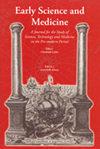Fascination and Action at a Distance in Francis Bacon
IF 0.2
2区 哲学
Q3 HISTORY & PHILOSOPHY OF SCIENCE
引用次数: 0
Abstract
Throughout his writings, Francis Bacon shows a great interest in the power of the imagination, both on other minds and on other bodies, a crucial part of natural magic. Convinced of the overall value of magic, Bacon nevertheless takes issue with the corrupt state into which he saw this discipline as having descended, overrun with false theories and invented stories. Bacon’s reform of experimental natural philosophy includes a naturalisation of magic, and this can be best illustrated when we look at his conception of fascination. In this paper, I show that the characteristics of this naturalisation are: (1) the definition of the object of study and the classification of phenomena; (2) the use of models and analogical thinking when the topic under study is difficult to observe; (3) the introduction of measurements and quantification of natural phenomena; (4) the need for replicability and diversification of experiments; and (5) the rejection of explanations in terms of occult qualities and their replacement with explanations in terms of the motion(s) of the spiritual matter emitted from the active body, which is impressed on the motion of the spiritual matter of the passive body.弗朗西斯·培根的《远方的魅力与行动》
在他的作品中,弗朗西斯·培根对想象力的力量表现出极大的兴趣,无论是对其他人的思想还是对其他人的身体,这是自然魔法的重要组成部分。尽管培根对魔术的整体价值深信不疑,但他认为魔术已经堕落到腐败的地步,充斥着错误的理论和虚构的故事。培根对实验自然哲学的改革包括魔术的自然化,当我们看他的魅力概念时,这一点可以得到最好的说明。本文认为,这种归化的特点是:(1)研究对象的界定和现象的分类;(2)在研究主题难以观察时使用模型和类比思维;(三)介绍对自然现象的测量和量化;(4)实验的可复制性和多样化;(5)拒绝用神秘的性质来解释,代之以用主动身体发出的精神物质的运动来解释,这种运动是在被动身体的精神物质的运动上留下印记的。
本文章由计算机程序翻译,如有差异,请以英文原文为准。
求助全文
约1分钟内获得全文
求助全文
来源期刊

Early Science and Medicine
HISTORY & PHILOSOPHY OF SCIENCE-
CiteScore
0.50
自引率
0.00%
发文量
22
审稿时长
>12 weeks
期刊介绍:
Early Science and Medicine (ESM) is a peer-reviewed international journal dedicated to the history of science, medicine and technology from the earliest times through to the end of the eighteenth century. The need to treat in a single journal all aspects of scientific activity and thought to the eighteenth century is due to two factors: to the continued importance of ancient sources throughout the Middle Ages and the early modern period, and to the comparably low degree of specialization and the high degree of disciplinary interdependence characterizing the period before the professionalization of science.
 求助内容:
求助内容: 应助结果提醒方式:
应助结果提醒方式:


